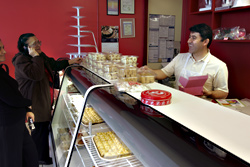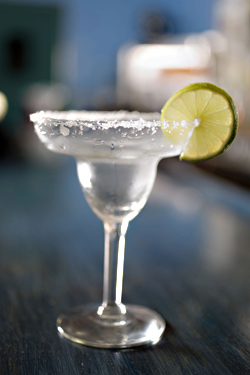When I returned from a year in Paris not long ago, I was, culinarily speaking, a new woman. I had uncovered the delights of North African–specifically Algerian–desserts. Upon relocating to Seattle, I realized the probability of finding a place where I could indulge my new obsession would be pretty low. Nonetheless, I struck out on a mission: to find Middle Eastern bakeries that would sate my cravings for the elegant, perfumed pastries and wholesome breads I’d grown to love.
My first stop: Northwest Halal, a small, nondescript white house next door to a SeaTac strip mall. It’s more of a pan–Middle Eastern stop-and-shop—where cooks can find ingredients such as barberries, pumpkin jam, and dried limes, or even buy flavored tobacco— rather than a true bakery as I had been told. On my first visit, I found only an empty pastry case strewn with trays. Owner Sayed Arif was there prepping bread dough and must have sensed my disappointment. He suggested I return a few days later, when fresh bread and baklava would be available. On my return visit, Sayed’s wife, Amena, had just placed a tray of baklava at the front counter. She makes it from walnuts, almonds, or pistachios, and if you have a preference, you should call to find out which is available (they don’t take orders). The almond baklava I had was spiked with cardamom (which I found distracting) and baked to a light golden brown. The texture was perfect, with just the right amount of honey to moisten and hold the pastry together without disrupting that balance of crispy and chewy that can make or break baklava.
In the back, three-foot-long loaves of golden, chewy Afghan nan were pulled fresh from the oven, and stacked high after cooling. Sayed, who is originally from Afghanistan and has run the shop for the past 10 years, says with a hint of exasperation that his non–Middle Eastern customers often use the bread as a pizza crust. Whatever you do with it, don’t leave without at least one loaf of this deliciously rustic bread. You can also order halal pizza to go or grab an order of kabobs with Afghani yellow rice and a square of fresh nan. Bread is baked three times weekly, and baklava is prepared every Tuesday.
Next was the year-old Minoo Bakery in Lake City, where glass pastry cases line the space like curio cabinets, and Persian cookies and cakes are on display like museum treasures. My guide to the exhibit was Nashmil Ghaderi, who owns the bakery with her husband, Ezzat. She introduced me to some of the most traditional and distinctly Iranian desserts they offer, such as clover-shaped nokhodchi. These traditional Persian cookies made from chickpea flour are subtly sweet, with a melt-in-your-mouth texture and earthy flavor. Minoo also sells them dipped in chocolate, perfect with a rich espresso or cup of strong tea (and popular among the shop’s non–Middle Eastern clientele). Ezzat joined us to explain that among Iranians the sweets are eaten during religious holidays, birthdays, and weddings, or offered as gifts by visitors.
Also worth trying at Minoo are the interesting and sticky-sweet baamieh—small, bite-size nuggets fried and then soaked in rose-water-flavored honey—and the kishmish, a light, silky-textured cookie made of rice flour and studded with raisins. Another interesting choice is the zaloubia, made from a batter of flour, yogurt, and rose water drizzled into hot oil for frying and then soaked in rose-water-infused honey. But the real standouts are the refined beheshti—a saffron-infused, pale yellow cookie made from rice flour—and falet, made with coconut, ground pistachios, or ground walnuts, with the chewy texture of a macaroon.
Ezzat and Nashmil also offer European-inspired pastries like éclairs filled with thick, sweetened whipped cream, which I initially assumed were created for the neighborhood’s non-Persian customers. But a Persian friend informed me that cream-filled, glazed, or frosted French-style pastries can sometimes be “Persian-ized” with the addition of nuts, honey, rose water, cardamom, or saffron.
Among Minoo’s cakes—whole or individual squares—the strawberry and chocolate are best. There are also a host of other chocolate-dipped and jam-filled cookies to try. Minoo Bakery sells coffee and has two tables, so you can enjoy your purchases immediately. Take a Sunday afternoon to sit and watch Lake City go by. Granted, the view isn’t exactly Paris, but the flavors will be.





